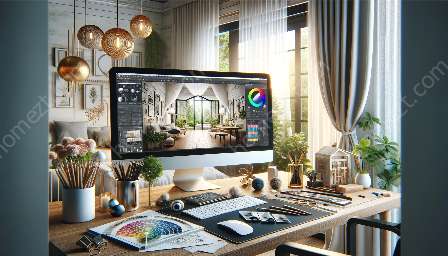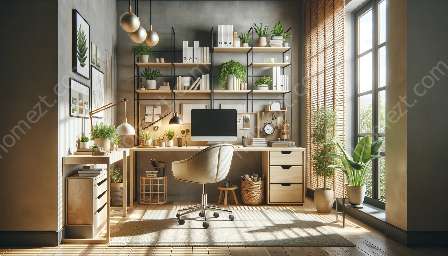Creating a productive and stylish home office or study room demands careful consideration of various factors when choosing the right furniture. From functionality and comfort to style and budget, the selection process can greatly impact the overall design and productivity of the space. This comprehensive guide will explore the important factors to consider when choosing furniture for a home office or study room, providing practical tips and insights for creating a functional and attractive work environment.
1. Functionality
Functionality should be one of the primary considerations when choosing furniture for a home office or study room. The furniture selected should cater to the specific needs of the individual, providing adequate storage, workspace, and organization options. Key furniture pieces to consider for functionality include:
- Desk: The desk is the focal point of a home office or study room. Consider the size and shape of the desk to ensure it fits the available space and provides ample room for work. Additionally, opt for a desk with built-in storage features such as drawers or shelves to keep the workspace organized.
- Chair: An ergonomic chair that offers proper support and comfort is essential for long hours of work. Look for adjustable features like height and lumbar support to prevent discomfort and promote good posture.
- Storage: Adequate storage is crucial for keeping the home office or study room organized. Consider bookshelves, filing cabinets, or storage units to store documents, books, and other essentials. A clutter-free environment can enhance productivity.
- Lighting: Proper lighting is essential for a productive work environment. Choose a combination of natural and artificial lighting options to minimize eye strain and create a well-lit space.
2. Comfort
Comfort plays a significant role in productivity and well-being, making it an important factor when choosing furniture for a home office or study room. Consider the following aspects to ensure comfort in the workspace:
- Ergonomics: Invest in ergonomic furniture pieces such as a supportive chair and an adjustable desk to promote good posture and reduce the risk of musculoskeletal issues.
- Comfortable Seating: Choose a chair with ample cushioning and proper lumbar support to ensure comfort during extended work hours.
- Workspace Layout: Arrange the furniture in a way that promotes efficient movement and accessibility, ensuring that the workspace layout contributes to a comfortable and user-friendly environment.
3. Style
The style of the furniture should complement the overall aesthetic of the home office or study room, creating a cohesive and visually appealing environment. Consider the following factors when evaluating the style of furniture:
- Design Cohesiveness: Ensure that the furniture pieces coordinate with the existing decor and design elements in the space, maintaining a harmonious visual appeal.
- Personal Preference: Consider the individual's personal style and preferences when selecting furniture, incorporating elements that reflect their taste and aesthetic sensibilities.
- Color Scheme: Choose furniture in colors that align with the overall color palette of the room, creating a cohesive and balanced visual composition.
- Function-Driven Style: Select furniture pieces that not only look stylish but also serve the functional needs of the space, striking a balance between aesthetics and practicality.
4. Budget
Setting a realistic budget is essential when choosing furniture for a home office or study room. Consider the following tips to ensure a budget-friendly approach to furniture selection:
- Prioritize Essentials: Identify the essential furniture pieces required for the home office, allocating a significant portion of the budget to these key items.
- Quality over Quantity: Invest in high-quality furniture pieces that offer durability and longevity, prioritizing long-term value over short-term savings.
- Consider Alternatives: Explore budget-friendly alternatives such as second-hand furniture, DIY projects, or cost-effective furniture options without compromising on quality or functionality.
- Seek Professional Advice: Consult with interior designers or furniture experts to explore cost-effective solutions and make informed decisions based on your budget limitations.
5. Function-Driven Styling
When choosing furniture for a home office or study room, it's important to integrate function-driven styling to enhance productivity and organization. Consider the following styling tips:
- Organizational Solutions: Opt for furniture pieces with built-in storage features to maximize organization and minimize clutter in the workspace.
- Multi-functional Furniture: Choose furniture items that serve multiple purposes, such as a desk with additional shelving or a storage ottoman that also functions as seating.
- Accessorize Thoughtfully: Incorporate decorative and functional accessories such as desk organizers, task lighting, and ergonomic tools to enhance the functionality of the workspace.
- Personalization: Infuse the space with personalized touches such as artwork, motivational quotes, and other elements that inspire productivity and creativity.
Conclusion
Choosing furniture for a home office or study room requires a thoughtful approach that considers functionality, comfort, style, and budget. By carefully evaluating these important factors, individuals can create a workspace that not only supports their work needs but also reflects their personal style and enhances overall productivity. With a focus on practicality and aesthetics, the selection of furniture for a home office can significantly contribute to a well-designed and productive work environment.


























